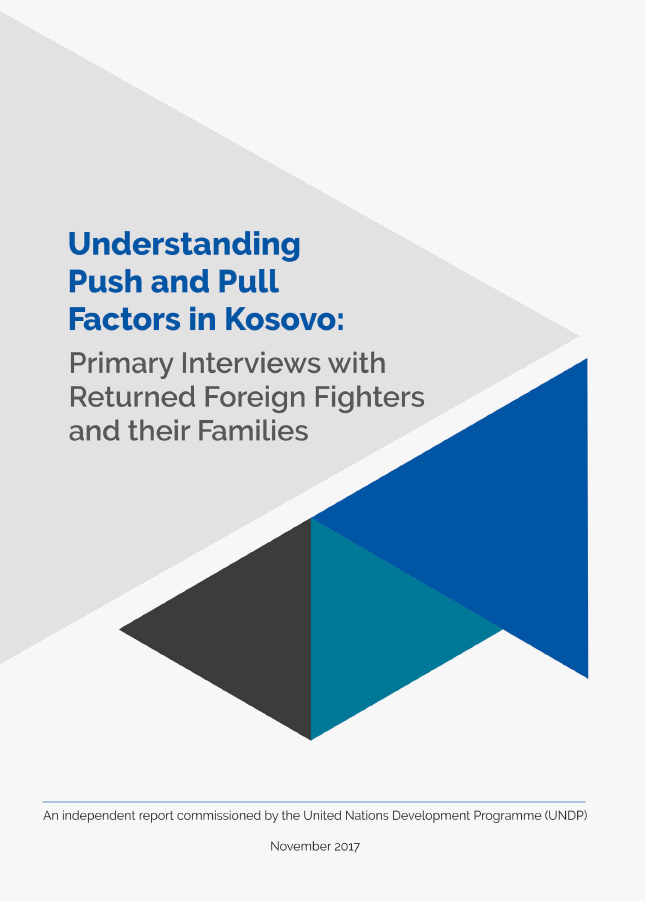In March 2017, UNDP commissioned an assessment of returned foreign terrorist fighters, currently serving their sentences in Kosovo1, either in prison or under house arrest, as well as their
families. The objective of this research assessment is to understand better the pull and push factors that make Kosovars join foreign terrorist groups, and support Kosovo institutions and international stakeholders in developing better policies and programmes for the prevention of violent extremism, as well as rehabilitation and reintegration programmes for returned foreign fighters.
Through analysis of the interviews and a literature review, the researchers have identified a series of push and pull factors that drove Kosovars to travel to conflict zones in Syria and Iraq.
However, this does not mean that there is one specific path to radicalization or one particular profile of a radicalized individual. Such generalizations are impossible to make and could lead
to ineffective policies Through cooperation with various Kosovo institutions, an unusual and complex piece of research was undertaken to better understand pathways and factors driving radicalization among Kosovars. The authors conducted 13 semi-structured primary interviews with returned fighters (8) and their families (3), as well as those who supported extremist groups
domestically .
In total, researchers conducted 13 semi-structured interviews:
- Six with people who were serving prison sentences on charges related to terrorism;
- Three with people in the process of appealing against the sentences of lower level courts on charges of terrorism;
- One with a person who had travelled to Syria and is not facing any charge; and
- Three with family members of returned foreign fighters.
These interviews were conducted in various municipalities across Kosovo, including in prisons, at the homes of convicted foreign fighters, and in public spaces. To conduct these interviews, the researchers based their approach on life story methodology, which is a qualitative method of data collection in which people are asked to document their life over a period of time and place, social ties to others, individual agency or control, and variations in the timing of key life events. The flow of foreign fighters from Kosovo to the conflicts in Syria and Iraq from 2012 to
2017 has been alarming. A total of 3353 Kosovars – men, women and children – are known to have travelled to or been born in the conflict-ridden region. Of these, 253 are men
who joined violent extremist groups such as ISIS, Jabhat Al Nusra, an offshoot of Al Qaeda, and Islamist group Ansar al Sham. This number amounts to approximately 140 fighters
per oe million inhabitants. However, the number of fighters from Kosovo ranks
Of these, 255 were men, 48 were women, and 57 were children. An additional 36 children were born in the conflict zone. The numbers differ slightly from the 21 March 2017 database that the Kosovo Police shared with the researchers, with the largest change being the number of children. The newly updated report includes 20 additional children, and a further 36 born in Syria or Iraq (93 children in total). The report also includes two additional men (255 in total), and seven fewer women (48 in total). Since researchers did not have access to the recently updated database, but only aggregate results, the analysis in the report is based on the database that was shared with the researchers on 21 March 2017. While researchers acknowledge that the analysis in this report is based on findings from six months ago, it still provides a relevant basis for analysis.
For full report see below:
 Search
Search


